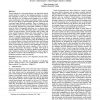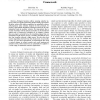26 search results - page 4 / 6 » Experiments in Adaptive Model-Based Force Control |
116
Voted
HAPTICS
2009
IEEE
15 years 8 months ago
2009
IEEE
Recent findings have shown that humans can adapt their internal control model to account for the changing dynamics of systems they manipulate. In this paper, we explore the effect...
118
Voted
ICRA
2009
IEEE
15 years 8 months ago
2009
IEEE
Abstract— Biological systems achieve amazing adaptive behavior with local agents performing simple sensing and actions. Modular robots with similar properties can potentially ach...
111
click to vote
ISPDC
2005
IEEE
15 years 7 months ago
2005
IEEE
DIET (Distributed Interactive Engineering Toolbox) is a toolbox for the construction of Network Enabled Server (NES) systems. For most NES systems, as for most grid middleware sys...
IWPC
2007
IEEE
15 years 8 months ago
2007
IEEE
The field of program comprehension is characterized by both the continuing development of new tools and techniques and the adaptation of existing techniques to address program co...
122
click to vote
MICRO
2008
IEEE
15 years 8 months ago
2008
IEEE
Any architectural optimization aims at satisfying the end user. However, modern architectures execute with little to no knowledge about the individual user. If architectures could...


